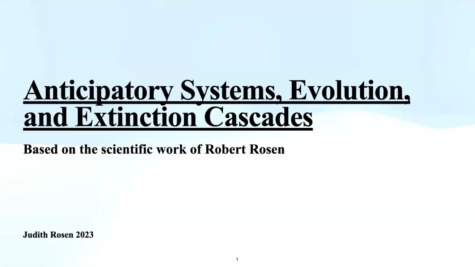Judith Rosen agreed to give an online presentation for the Systems Thinking Ontario meeting in October 2023, after we converted her in-person meeting at OCADU in August into a discussion circle. Channelling the anticipatory systems approach of her father, mathematical biologist Robert Rosen, Judith has been extended those ideas in her own continuing observation of living systems.
This recording of the session is available on Youtube, as well as on the Internet Archive .
| Video | H.264 MP4 |
| October 16 (1h53m) |
[20231016_ST-ON_Rosen AnticipatorySystems 925kbps_1760x900.m4v] (1760×900 925kbps 883MB) [on the Internet Archive] |
An audio has been extracted from the video.
| Audio | |
| October 16 (1h53m) |
[20231016_ST-ON Rosen_AnticipatorySystems.mp3] (110 MB) [on the Internet Archive] |
A copy of the research article is posted on the wiki.st-on.org . Here’s the original abstract.
When we think about evolution — specifically the entailment underlying the process of change in species of living organisms, over eons of time, which we call “evolution” — and as we seek to increase our scientific understanding of it, one glaring omission is that there is no mention of the fact that living organisms manifest patterns of behavior that are radically different from non-living systems. Life does not just react, the way all non-living systems do; life also Anticipates. Therefore, we need to factor in the Anticipatory nature of all life into our models (both our mental models and scientific models) and see where that leads us in our understanding. This peculiar Anticipatory pattern of behavior is, in fact, the “signature” of life. According to Robert Rosen, the Anticipatory pattern is ubiquitous in biological systems, at all scales of organization, and is common to all life forms regardless of species. In higher life forms, such as homo sapiens, it is the very same pattern that characterizes mind as well.
Robert Rosen (1934-1998) developed Anticipatory Systems Theory as part of his work in theoretical biology. He predicted that the Anticipatory pattern of behavior he described will, similarly, be present in extraterrestrial life. It is how we recognize living organisms as being “alive” even if we’ve never seen that species before; how we differentiate living systems from non-living systems (whether we are doing so as scientists or not. But, if we seek to understand the entailment of evolutionary processes, then to leave this out of our models is guaranteed to cause problems. Nowhere is the omission more dangerous than in understanding the entailment of extinction cascades.
As it happens, the Anticipatory nature of life has a dark side. For all the benefits it offers, rapid change in the environment is its Achilles Heel. With human-induced rapid global climate change, we are facing a period of such accelerated change that the only things in the fossil record that bear any resemblance to it are the intermittent cataclysms such as large asteroid strikes — which have caused several mass extinctions throughout Earth’s history. Human activity has now (by 2022) changed the composition of Earth’s atmosphere to such a degree that interactions with solar energy are also changing.
Furthermore, the chemistry of the oceans are measurably changing because of the changes in atmospheric composition — becoming more acidic, for example. Thermodynamic changes are also manifesting themselves because of those initial changes, which impacts weather patterns. Changing weather patterns and oscillation between extremes in weather are driving further changes in ecosystems all over the planet. As the planet warms up, sea levels rise. It would be foolish to think that any of these fundamental changes are going to be without consequences to the biosphere. Extinction cascades are made of this. But why? How?
This talk will describe the fundamentals of Anticipatory Systems Theory, and sketch out how this necessarily must be involved in evolutionary entailment. It will illustrate how rapid change in environments causes difficulties that are peculiar to life, and thereby elucidate the entailment of extinction cascades from an Anticipatory Systems perspective. It is hoped that participants will finish with a much better idea of the need for integration of these ideas into our collective efforts, in science and in government. Intelligent planning for the future requires it.
Bio: Judith Rosen is a writer, and science researcher residing in Rochester, NY. She carries on the work of her father, Robert Rosen, republishing materials previously unavailable. Judith often translates the ideas of Robert Rosen to both experts and novices. She has been a long-time contributor to the International Society for the Systems Sciences, and has served as a Vice-President of Conferences.
Suggested pre-reading:
- Robert Rosen (biologist) on Wikipedia
- Judith Rosen: The Modeling Relation And Anticipatory System Theory by Robert Rosen | Club of Remy | 2020 at https://www.youtube.com/watch?v=ncK-XMxoEdo



